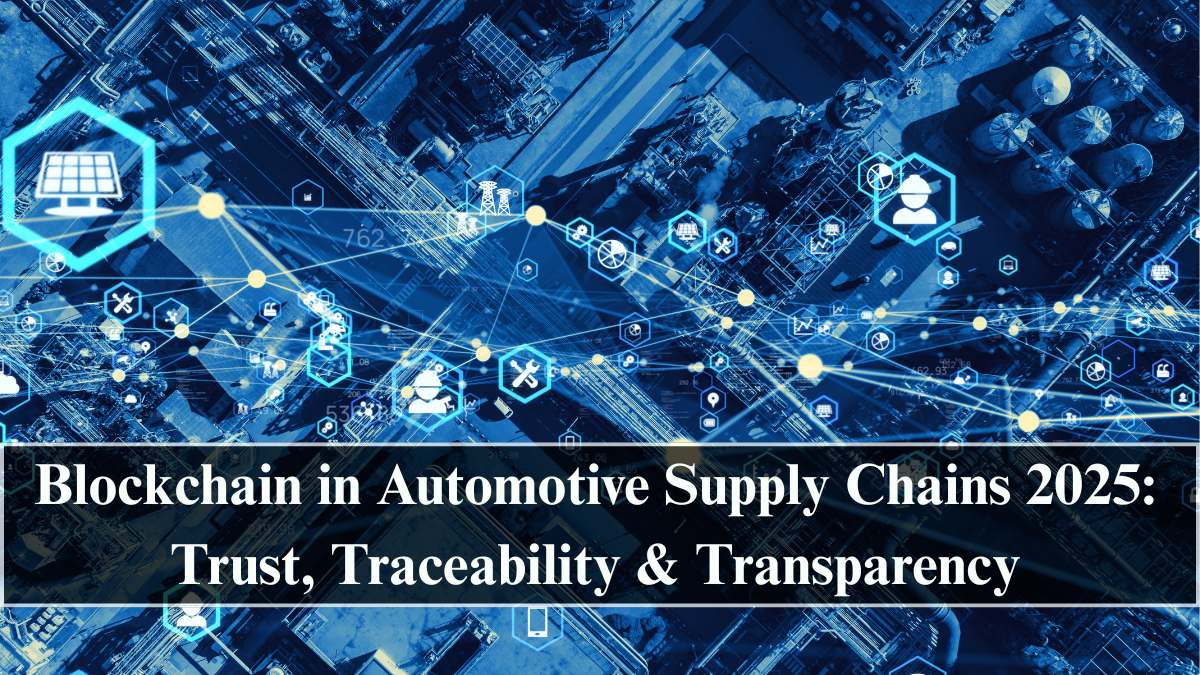In 2025, blockchain technology has evolved from a financial innovation into a powerful industrial tool — transforming how automakers manage global supply chains. Blockchain in Automotive Supply Chains 2025 brings a new level of trust, traceability, and efficiency to one of the world’s most complex manufacturing ecosystems.
From raw material sourcing to vehicle delivery, blockchain ensures every transaction, part, and supplier is recorded immutably and transparently. This shift is solving long-standing industry challenges such as counterfeit parts, data silos, and compliance inefficiencies, creating a more resilient and accountable automotive industry.

Why Blockchain Matters in Automotive Manufacturing
The automotive supply chain involves thousands of components and hundreds of suppliers distributed across continents. Traditionally, these networks have been opaque and fragmented, relying on outdated systems for record-keeping and verification.
Blockchain technology changes this by creating a shared, tamper-proof ledger where every stakeholder — from manufacturers to logistics partners — can view and verify the same data in real time.
Key advantages include:
-
Transparency: Every transaction is visible and verifiable by authorized parties.
-
Security: Immutable data prevents fraud and counterfeiting.
-
Efficiency: Smart contracts automate processes like payments and compliance checks.
-
Traceability: Tracks parts and materials from origin to end-of-life.
By 2025, blockchain has become the backbone of digital trust in automotive production.
How Blockchain Enhances Supply Chain Operations
Automotive companies are integrating blockchain into multiple layers of the supply chain to ensure data accuracy and accountability.
-
Parts Traceability: Each vehicle component is tagged with a unique blockchain record, ensuring authenticity and preventing counterfeit parts.
-
Logistics Management: Blockchain tracks parts from factory to dealership, enabling real-time visibility across global shipments.
-
Quality Assurance: Production data, including testing and inspection logs, are securely stored and instantly accessible.
-
Supplier Verification: Blockchain validates certifications, environmental compliance, and ethical sourcing.
-
After-Sales and Recalls: Vehicle maintenance records are stored immutably, allowing seamless tracking of recalls or service updates.
This level of digital verification eliminates ambiguity, helping manufacturers streamline production while maintaining trust throughout the value chain.
Industry Leaders and Global Adoption in 2025
The use of blockchain in automotive supply chains has moved far beyond pilot programs — it’s now standard practice among global automakers.
-
BMW’s PartChain Project records every step of component sourcing and assembly, ensuring data integrity across suppliers.
-
Ford Motor Company uses blockchain to trace cobalt and lithium sources, promoting ethical mining and sustainability.
-
Mercedes-Benz leverages blockchain for carbon tracking and supplier emissions verification.
-
Volvo and Jaguar Land Rover implement blockchain for spare parts traceability and predictive maintenance records.
-
Toyota is investing in blockchain-enabled smart contracts for supplier payments and logistics management.
Collaboration between automakers, technology firms, and governments has led to interoperable blockchain platforms that ensure consistency across borders.
The Role of Smart Contracts in Supply Chain Automation
A major breakthrough in 2025 is the widespread adoption of smart contracts — self-executing digital agreements embedded within blockchain networks.
For example:
-
When a verified shipment of parts arrives at a factory, a smart contract automatically triggers supplier payment.
-
If a part fails a quality check, the system alerts stakeholders instantly and blocks further distribution.
This automation reduces administrative overhead, minimizes delays, and eliminates the need for intermediaries.
Smart contracts also enhance regulatory compliance, automatically recording emissions data, labor certifications, and material origins in immutable form.
Benefits of Blockchain Integration in Automotive Supply Chains
The automotive industry is realizing significant gains from blockchain integration:
-
End-to-End Transparency: Every transaction is verified in real time.
-
Fraud Prevention: Counterfeit components are virtually eliminated.
-
Operational Efficiency: Automated workflows reduce paperwork and delays.
-
Sustainability Tracking: Carbon footprint data is traceable from raw materials to production.
-
Customer Confidence: Buyers can verify the authenticity and service history of vehicles.
This technological transparency strengthens both brand reputation and regulatory compliance, two critical pillars for modern automotive success.
Challenges and the Path Forward
Despite major progress, challenges persist. Integrating blockchain with legacy systems, ensuring data interoperability, and maintaining cybersecurity at scale remain complex tasks.
Cost is another factor — implementing blockchain across global operations requires infrastructure investment and staff training. However, open-source blockchain frameworks and cloud-based APIs are reducing these barriers, allowing even mid-sized manufacturers to participate.
Governments are also recognizing blockchain’s potential in promoting supply chain transparency and sustainability, providing incentives and regulatory frameworks to encourage adoption.
By 2030, experts predict that blockchain will underpin over 80% of global automotive transactions, linking manufacturing, logistics, and service ecosystems under one secure digital framework.
The Future of Transparent Manufacturing
Blockchain in Automotive Supply Chains 2025 marks a defining step toward a smarter, cleaner, and more ethical automotive world. By combining digital trust with automation, blockchain is empowering manufacturers to build vehicles that are not only efficient — but verifiably sustainable, traceable, and accountable from origin to ownership.
This transparent future ensures that every nut, bolt, and battery is backed by data — a new gold standard in global mobility.
FAQs
What is blockchain in automotive supply chains?
It’s a distributed digital ledger that securely records and verifies transactions across all stages of automotive manufacturing and logistics.
How does blockchain improve transparency?
It allows all participants in the supply chain to view verified, immutable data on part origins, production processes, and quality checks.
What are smart contracts in supply chains?
They are automated agreements that execute tasks — like payments or compliance checks — when predefined conditions are met.
Which automakers are using blockchain in 2025?
BMW, Mercedes-Benz, Toyota, Ford, and Volvo are leading in blockchain-based supply chain management and sustainability tracking.
What’s the future of blockchain in the automotive sector?
By 2030, blockchain will form the digital backbone of global vehicle manufacturing, ensuring ethical sourcing, trust, and full transparency.
Click here to know more.
